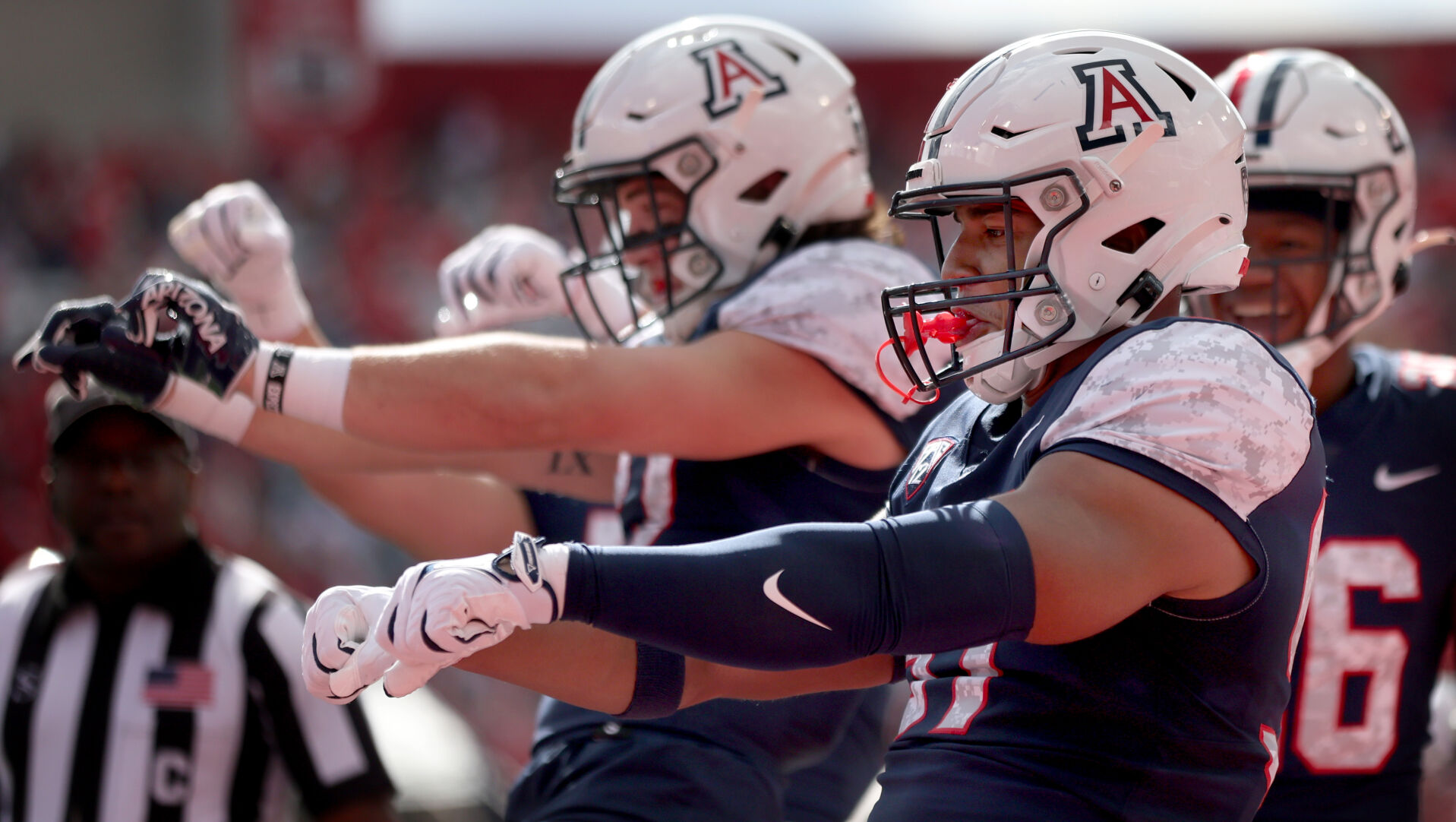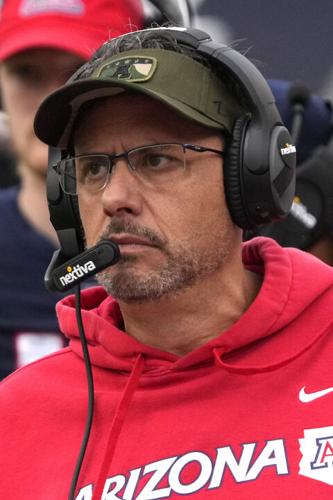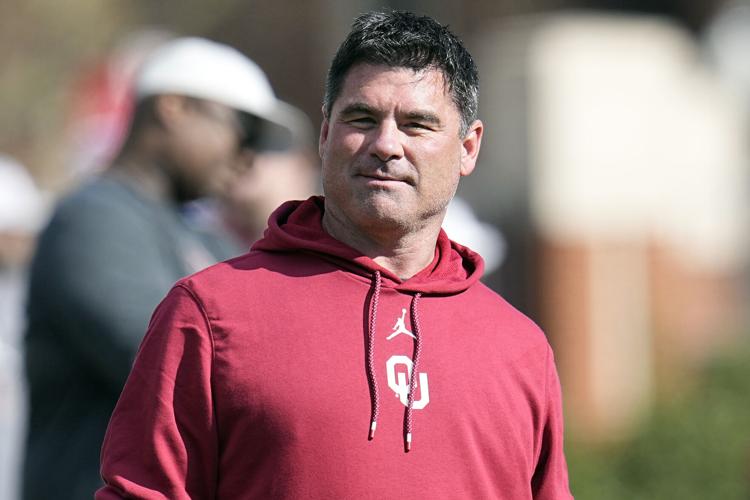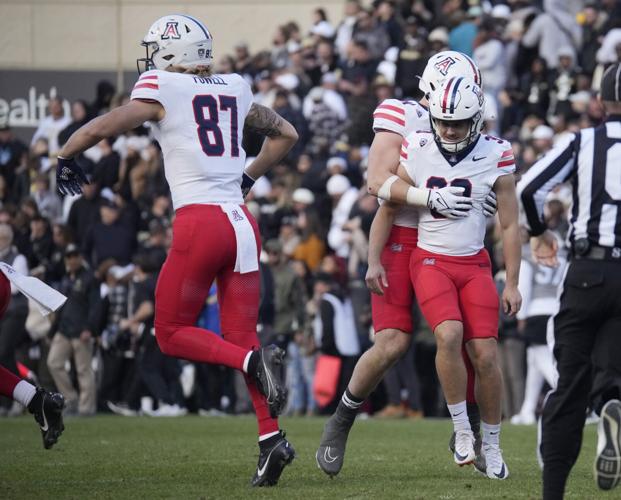The bowl-game experience for college football teams is supposed to be fun.
It gives players, coaches and staffers a chance to spend the holiday season as a unit in a different city (sometimes even in a different country, like the Bahamas Bowl in less than two weeks).
Gifts are involved, too, such as watches, gift cards, gaming consoles, backpacks and bowl merchandise.
The way Arizona head coach Jedd Fisch looks at the 14th-ranked Wildcats’ matchup with No. 12 Oklahoma in the Valero Alamo Bowl in San Antonio, “the team that wins the bowl game is the team that takes it serious,” he said.
“There’s two ways to prepare for a bowl game: You could choose it as a celebration of the season or you choose it as a championship game. Those are the two options,” Fisch said. “We’re going to choose it as a championship game.”
Amid sight-seeing, a trip down the River Walk and chowing down on Tex-Mex food, it’s mostly business for the Wildcats once they arrive to San Antonio on Dec. 23, as they look to become the third team in program history to win at least 10 games in a season, joining the 1998 Holiday Bowl squad (12-1) and the Pac-12 South champion 2014 team (10-4).

Arizona kicker Tyler Loop, front right, is congratulated after kicking the winning field goal by tight end Tanner McLachlan, back right, as tight end Tyler Powell (87) also celebrates as the Wildcats defeated Colorado in Boulder, Colorado, last November.
Evolving from a 1-11 club just two years ago to 9-3 this season, there’s plenty to celebrate for Arizona, but Fisch and the Wildcats are yearning for the UA’s first bowl win since 2015.
“If it’s a celebration of the season, it’s easy to slack off for a little bit or not think missing curfew matters or just enjoy the bowl experience. The goal is to win, so that’s the message I’ve given.”
Among the perks of Arizona’s bowl game is the nearly month-long stretch of practices, including the first week of practice “heavily focused on the young players on our roster, and a huge focus on how good we can get these guys, how much we can improve over that time.”
In the six-year span between the Wildcats’ bowl appearances, the Utah Utes, a benchmark program for Arizona, have “had 90 more practices than we’ve had,” Fisch said.
“When you look at that, what does that mean? I mean, 90 practices — training camp is only 28 practices,” Fisch said. “You’re talking about three more training camps than we had to be able to compete — and we’ve had coaching changes in there as well.
“Where the momentum comes from is, really, getting better, the team is around each other more, the team believes in each other more, they’re closer together, and sure, when you’re playing December 28th on ESPN, recruits are going to notice it, and they’re going to see how you play the game.”
The hope for Fisch and Arizona? The demanding work dedicated to restoring UA football to relevance will sell itself on the national stage and attract free agents — err, transfer portal prospects — to Tucson.
“The way we play the game, people should want to come here,” Fisch said. “We play the game in a manner that people should say, ‘I want to go play at Arizona and I really don’t care about the rest.’ The reason why is because we can develop guys into becoming NFL players. We’ve shown that, we can do that, we will do that. We’ll have a ton of players that will be in the NFL next year and years beyond that.
“We’re watched by NFL (general managers), we’re watched by NFL head coaches. Most coaches in (the NFL) can tell you how Arizona did every Saturday. “

Seth Littrell (pictured during Oklahoma’s spring practice in March) was promoted last week from offensive analyst to the Sooners’ offensive coordinator role. Littrell fills the spot Jeff Lebby vacated when he left to become Mississippi State’s head coach.
Fisch and Oklahoma OC share bond
It’s not a rarity for college football coaches to rub elbows with their coaching cohorts. Fisch and promoted Oklahoma co-offensive coordinator Seth Littrell first met each other at the Pebble Beach Coaches Classic golf event over Memorial Day weekend not long after Fisch was first hired at Arizona.
The golf tournament is organized by the Dick Tomey Legacy Fund, which helps raise money to support coaching, athlete, and parent training in Hawaii, Arizona and San Jose, places where the late UA coaching icon made an impact.
“We enjoyed our time together,” Fisch said of Littrell.
Who has the better golf game?
“I don’t know, we never played together. But I would guess, most of the time, the other person,” Fisch said with a grin.
Fisch and Littrell’s offensive play-calling will be matched up against each other in the Alamo Bowl. Littrell, who was an offensive coordinator for the Wildcats for two seasons while mentoring eventual Super Bowl MVP quarterback Nick Foles, and Joe Jon Finley will be sharing offensive coordinator duties for the Sooners. Littrell and Finley will replace Jeff Lebby, who recently became the head coach at Mississippi State.
Not only will Oklahoma have new play-callers, the Sooners will also have a new quarterback, with two-year starter Dillon Gabriel entering the transfer portal on Monday; he’s received interest from Oregon and USC, among others. Gabriel is one of 11 OU players to transfer since the portal opened on Monday. Gabriel will be replaced by former five-star recruit Jackson Arnold, a freshman this season.
“Their offense has a little bit of a change to it now, so we’ll have to see what that ends up looking like,” Fisch said. “They’re pretty similar to us offensively statistically, and I’ll believe it’ll be a great challenge for our defense.”
When Littrell, a Mike Leach disciple, was the head coach at North Texas, the Mean Green’s air-raid offense ranked in the Top 30 nationally in 2017 and 2018.
“I know Seth and I think he’s a great coach, so we’ll have to see what he does, if he does anything different than what Coach Lebby was doing, so we’ll have to keep an eye on that, but we won’t know. So we’re going to have to prepare for a good, potent offensive attack.
“We’re going to have watch a lot of tape of what happened at North Texas and Oklahoma this year and see what we can put together to figure out the best way to defend them.”
Extra points:
Arizona left tackle Jordan Morgan was named a Second Team All-American by CBS Sports on Wednesday.
Arizona senior defensive end Orin Patu, who logged four tackles in two games this season, entered the transfer portal on Tuesday. The 6-4, 245-pounder from Seattle transferred to Arizona after four seasons at Cal. Patu is the the sixth player to leave the program since the transfer portal opened. Patu’s younger brother, defensive back Kayo Patu, also decommitted from the Wildcats’ 2024 recruiting class.
Arizona head coach Jedd Fisch says the Wildcats are "a very close-knit team with the coaches and players alike," which has been essential in the program's ascension. Video by Justin Spears / Arizona Daily Star







